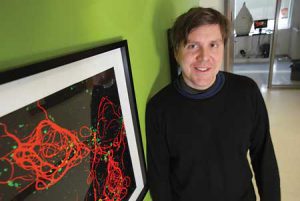
By Jake Brennan
Deep down, in our gut, we all have a soft spot for migrant workers. How else to explain the thriving community of bacteria each of us hosts in our intestines? We foster their residency so they’ll continue to do the work our bodies refuse to: sorting through our food and packaging it for export. And as long as they let us ID them – our bodies’ police ensure that, says McGill’s Dr. Jörg Fritz, from the Department of Microbiology and Immunology – there are no flare-ups and everything flows smoothly.
But how do these police – our immune system’s antibodies – cross-talk with these migrant microbiota, maintaining a peaceful dialogue while distinguishing the good, industrious bacteria from the troublemakers, to keep the community happy? Or, as Fritz puts it, “Why are we not dying from the trillions of bacteria we have in our gut?”
After all, bacteria are unwelcome everywhere else in our bodies, but in our gut we are actually colonized by them. How we maintain this state is a mystery that lured Fritz to look closer. And in 2010, McGill brought Fritz, his Canadian Institutes of Health Research grant in hand, to colonize a lab in the Bellini Pavilion, where he and his students are untangling the gut’s function.
Since beginning graduate school in his native Austria, then completing his post-doctoral research at the University of Toronto, Fritz has been examining vaccines and immune response. Specializing in the digestive system was a natural move: it not only meant examining the body’s most microbe-ridden site, but was also a pursuit of his natural interests, he jokes. “Being from Vienna, I’m a culinary hedonist, of course – especially sweets.”
Wall-to-intestinal-wall of microbes
Digestion of a fine Viennese torte, or any other food, begins with our saliva. Next, our stomach acid takes care of the major demolition. Then it’s on to the small intestine, where bacteria thrive, deconstructing the baker’s work so that we may absorb the torte’s ample calories, plus any vitamins and minerals that may have snuck in. Final breakdown and water absorption takes place in the large intestine, and then, well, you know the rest.
For nutrient extraction in the two parts of the intestine – the gut – we are entirely dependent on these bacteria, what Fritz calls an outsourcing strategy. As their elimination in the stool necessitates their constant reproduction in the gut, the body has to have some kind of identification system to keep tabs on the traffic. But what mechanisms do mammals use to recognize these foreign bodies at the cellular level, in order to maintain crowd control and tailor our body’s overall immune response?
All-powerful microbes
In the intestines, we have B-lineage cells, a type of white blood cell that produces the antibody immunoglobulin A (IgA). IgA polices the gut, attacking pathogens but also keeping good bacteria in check.
Researchers previously thought that other microbe-detecting immune cells regulate B cells in the gut. But in a paper published in Nature in January, lead author Fritz and colleagues found a mechanism within the B cell that seems to be regulated by the microbes themselves. When
they knocked that mechanism out genetically, the B cells had a severe defect in producing IgA, demonstrating that, as he says, “every cell in our intestine is influenced by the presence of microbes there.” It seems the police are taking their orders, at least partially, from the workers they’re meant to control.
Although Fritz does not yet know exactly how these mechanisms are regulated in the B cells, let alone what is going on at the molecular level, the finding does give insight into the gut’s chains of command for its constant peace-keeping mandate. The research could eventually contribute to the development of vaccines for mucosal infections such as streptococcus and pneumonia, but that’s still a ways off. And since new genetic sequencing technologies opened this field up a mere decade ago, it is still wide-open research terrain, says Fritz.
“There’s plenty to go at, but as many people become interested in it, it’s becoming very competitive. You have to select carefully where you place your cards.” In other words, unfortunately he can’t just go with his gut.
